
alignment-handbook
Robust recipes to align language models with human and AI preferences
Stars: 5345
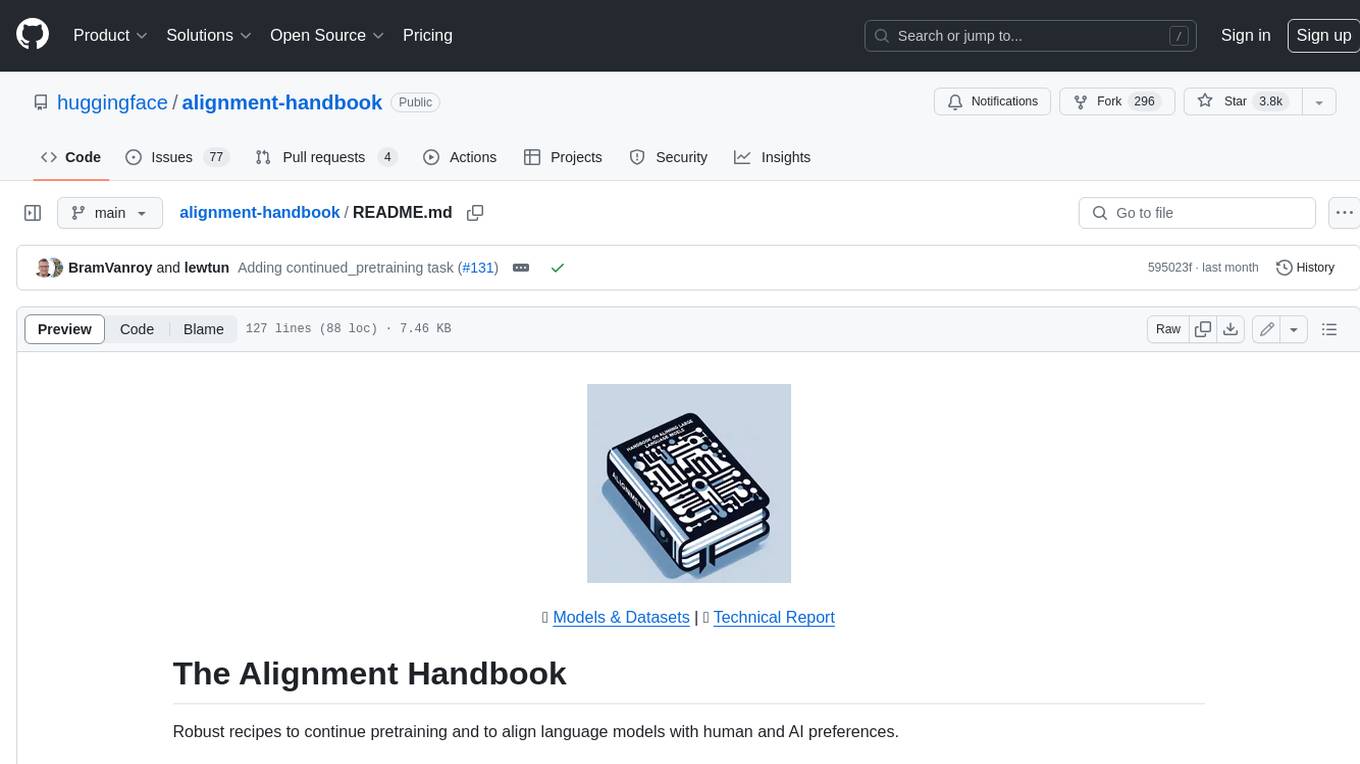
The Alignment Handbook provides robust training recipes for continuing pretraining and aligning language models with human and AI preferences. It includes techniques such as continued pretraining, supervised fine-tuning, reward modeling, rejection sampling, and direct preference optimization (DPO). The handbook aims to fill the gap in public resources on training these models, collecting data, and measuring metrics for optimal downstream performance.
README:
🤗 Models & Datasets | 📃 Technical Report
Robust recipes to continue pretraining and to align language models with human and AI preferences.
Just one year ago, chatbots were out of fashion and most people hadn't heard about techniques like Reinforcement Learning from Human Feedback (RLHF) to align language models with human preferences. Then, OpenAI broke the internet with ChatGPT and Meta followed suit by releasing the Llama series of language models which enabled the ML community to build their very own capable chatbots. This has led to a rich ecosystem of datasets and models that have mostly focused on teaching language models to follow instructions through supervised fine-tuning (SFT).
However, we know from the InstructGPT and Llama2 papers that significant gains in helpfulness and safety can be had by augmenting SFT with human (or AI) preferences. At the same time, aligning language models to a set of preferences is a fairly novel idea and there are few public resources available on how to train these models, what data to collect, and what metrics to measure for best downstream performance.
The Alignment Handbook aims to fill that gap by providing the community with a series of robust training recipes that span the whole pipeline.
- July 24, 2025: We release the full post-training recipe behind SmolLM3-3B: a state-of-the-art hybrid reasoning model 💭
- November 21, 2024: We release the recipe for fine-tuning SmolLM2-Instruct.
- August 18, 2024: We release SmolLM-Instruct v0.2, along with the recipe to fine-tuning small LLMs 💻
- April 12, 2024: We release Zephyr 141B (A35B), in collaboration with Argilla and Kaist AI, along with the recipe to fine-tune Mixtral 8x22B with ORPO 🪁
- March 12, 2024: We release StarChat2 15B, along with the recipe to train capable coding assistants 🌟
- March 1, 2024: We release Zephyr 7B Gemma, which is a new recipe to align Gemma 7B with RLAIF 🔥
- February 1, 2024: We release a recipe to align open LLMs with Constitutional AI 📜! See the recipe and the blog post for details.
- January 18, 2024: We release a suite of evaluations of DPO vs KTO vs IPO, see the recipe and the blog post for details.
- November 10, 2023: We release all the training code to replicate Zephyr-7b-β 🪁! We also release No Robots, a brand new dataset of 10,000 instructions and demonstrations written entirely by skilled human annotators.
This project is simple by design and mostly consists of:
-
scriptsto train and evaluate models. Four steps are included: continued pretraining, supervised-finetuning (SFT) for chat, preference alignment with DPO, and supervised-finetuning with preference alignment with ORPO. Each script supports distributed training of the full model weights with DeepSpeed ZeRO-3, or LoRA/QLoRA for parameter-efficient fine-tuning. -
recipesto reproduce models like Zephyr 7B. Each recipe takes the form of a YAML file which contains all the parameters associated with a single training run. Agpt2-nlrecipe is also given to illustrate how this handbook can be used for language or domain adaptation, e.g. by continuing to pretrain on a different language, and then SFT and DPO tuning the result.
We are also working on a series of guides to explain how methods like direct preference optimization (DPO) work, along with lessons learned from gathering human preferences in practice. To get started, we recommend the following:
- Follow the installation instructions to set up your environment etc.
- Replicate Zephyr-7b-β by following the recipe instructions.
If you would like to train chat models on your own datasets, we recommend following the dataset formatting instructions here.
The initial release of the handbook will focus on the following techniques:
- Continued pretraining: adapt language models to a new language or domain, or simply improve it by continued pretraining (causal language modeling) on a new dataset.
- Supervised fine-tuning: teach language models to follow instructions and tips on how to collect and curate your training dataset.
- Reward modeling: teach language models to distinguish model responses according to human or AI preferences.
- Rejection sampling: a simple, but powerful technique to boost the performance of your SFT model.
- Direct preference optimisation (DPO): a powerful and promising alternative to PPO.
- Odds Ratio Preference Optimisation (ORPO): a technique to fine-tune language models with human preferences, combining SFT and DPO in a single stage.
To run the code in this project, first, create a Python virtual environment using e.g. uv:
uv venv handbook --python 3.11 && source handbook/bin/activate && uv pip install --upgrade pip[!TIP] To install
uv, follow the UV Installation Guide.
Next, install PyTorch v2.6.0
uv pip install torch==2.6.0 --index-url https://download.pytorch.org/whl/cu126Note that the precise version is important for reproducibility! Since this is hardware-dependent, we also direct you to the PyTorch Installation Page.
You can then install the remaining package dependencies as follows:
uv pip install .You will also need Flash Attention 2 installed, which can be done by running:
uv pip install "flash-attn==2.7.4.post1" --no-build-isolationNext, log into your Hugging Face account as follows:
huggingface-cli loginFinally, install Git LFS so that you can push models to the Hugging Face Hub:
sudo apt-get install git-lfsYou can now check out the scripts and recipes directories for instructions on how to train some models 🪁!
├── LICENSE
├── Makefile <- Makefile with commands like `make style`
├── README.md <- The top-level README for developers using this project
├── recipes <- Recipe configs, accelerate configs, slurm scripts
├── scripts <- Scripts to train and evaluate chat models
├── setup.cfg <- Installation config (mostly used for configuring code quality & tests)
├── setup.py <- Makes project pip installable (pip install -e .) so `alignment` can be imported
├── src <- Source code for use in this project
└── tests <- Unit tests
If you find the content of this repo useful in your work, please cite it as follows via \usepackage{biblatex}:
@software{Tunstall_The_Alignment_Handbook,
author = {Tunstall, Lewis and Beeching, Edward and Lambert, Nathan and Rajani, Nazneen and Huang, Shengyi and Rasul, Kashif and Bartolome, Alvaro, and M. Patiño, Carlos and M. Rush, Alexander and Wolf, Thomas},
license = {Apache-2.0},
title = {{The Alignment Handbook}},
url = {https://github.com/huggingface/alignment-handbook},
version = {0.4.0.dev0}
}For Tasks:
Click tags to check more tools for each tasksFor Jobs:
Alternative AI tools for alignment-handbook
Similar Open Source Tools

alignment-handbook
The Alignment Handbook provides robust training recipes for continuing pretraining and aligning language models with human and AI preferences. It includes techniques such as continued pretraining, supervised fine-tuning, reward modeling, rejection sampling, and direct preference optimization (DPO). The handbook aims to fill the gap in public resources on training these models, collecting data, and measuring metrics for optimal downstream performance.
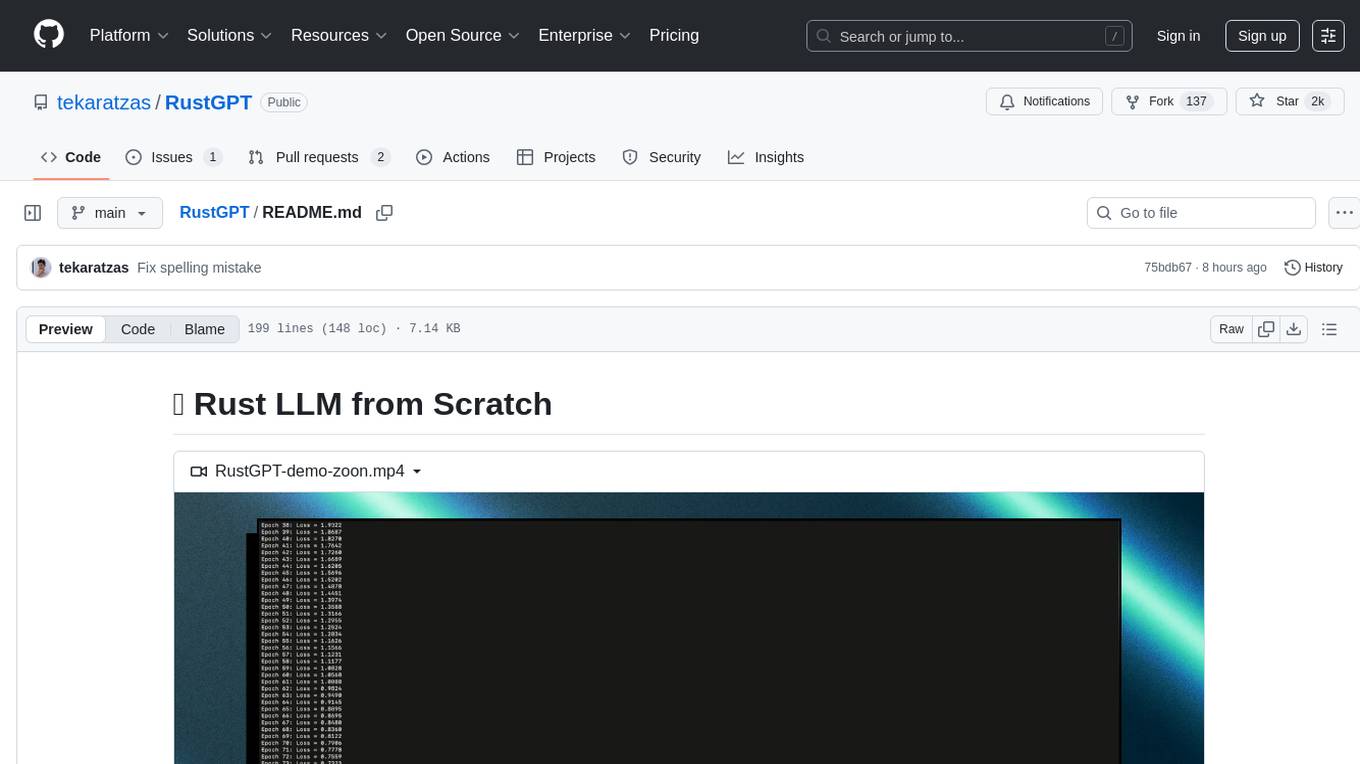
RustGPT
A complete Large Language Model implementation in pure Rust with no external ML frameworks. Demonstrates building a transformer-based language model from scratch, including pre-training, instruction tuning, interactive chat mode, full backpropagation, and modular architecture. Model learns basic world knowledge and conversational patterns. Features custom tokenization, greedy decoding, gradient clipping, modular layer system, and comprehensive test coverage. Ideal for understanding modern LLMs and key ML concepts. Dependencies include ndarray for matrix operations and rand for random number generation. Contributions welcome for model persistence, performance optimizations, better sampling, evaluation metrics, advanced architectures, training improvements, data handling, and model analysis. Follows standard Rust conventions and encourages contributions at beginner, intermediate, and advanced levels.
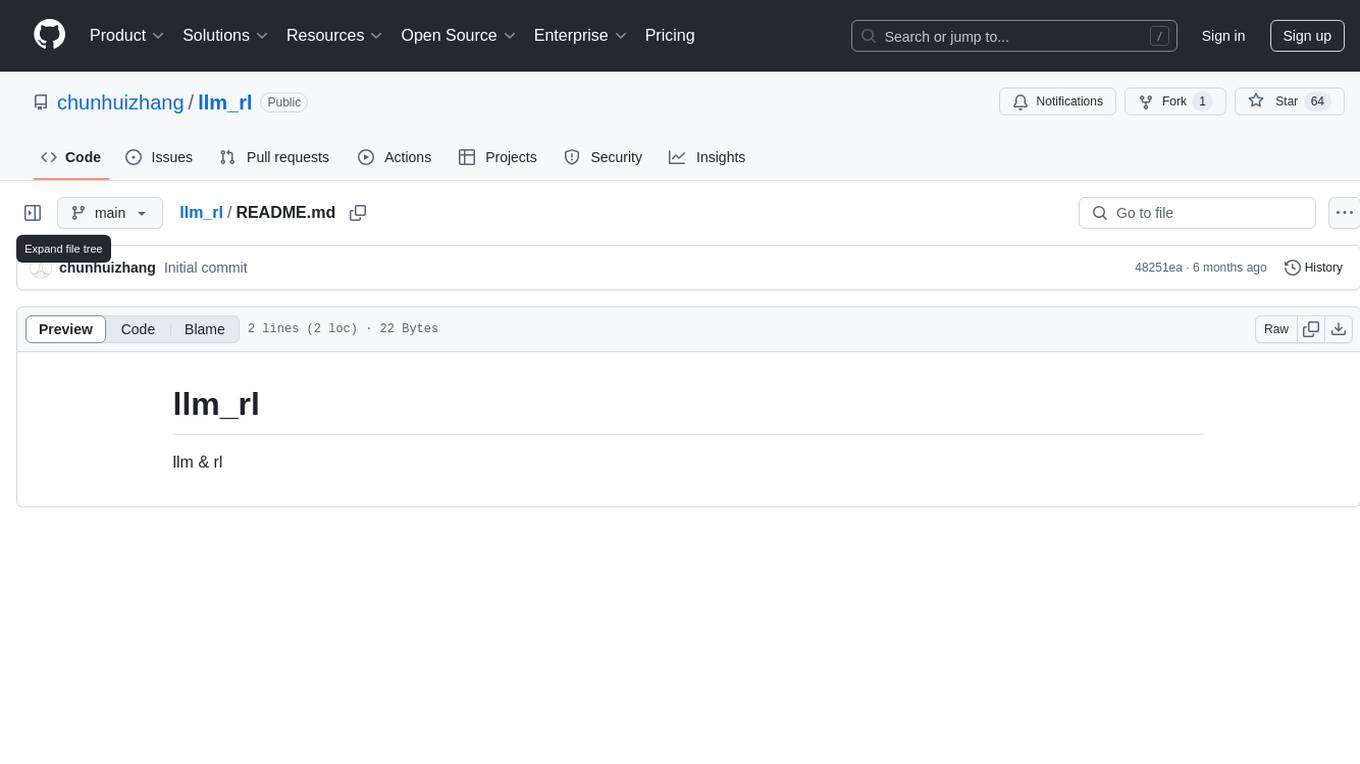
llm_rl
llm_rl is a repository that combines llm (language model) and rl (reinforcement learning) techniques. It likely focuses on using language models in reinforcement learning tasks, such as natural language understanding and generation. The repository may contain implementations of algorithms that leverage both llm and rl to improve performance in various tasks. Developers interested in exploring the intersection of language models and reinforcement learning may find this repository useful for research and experimentation.
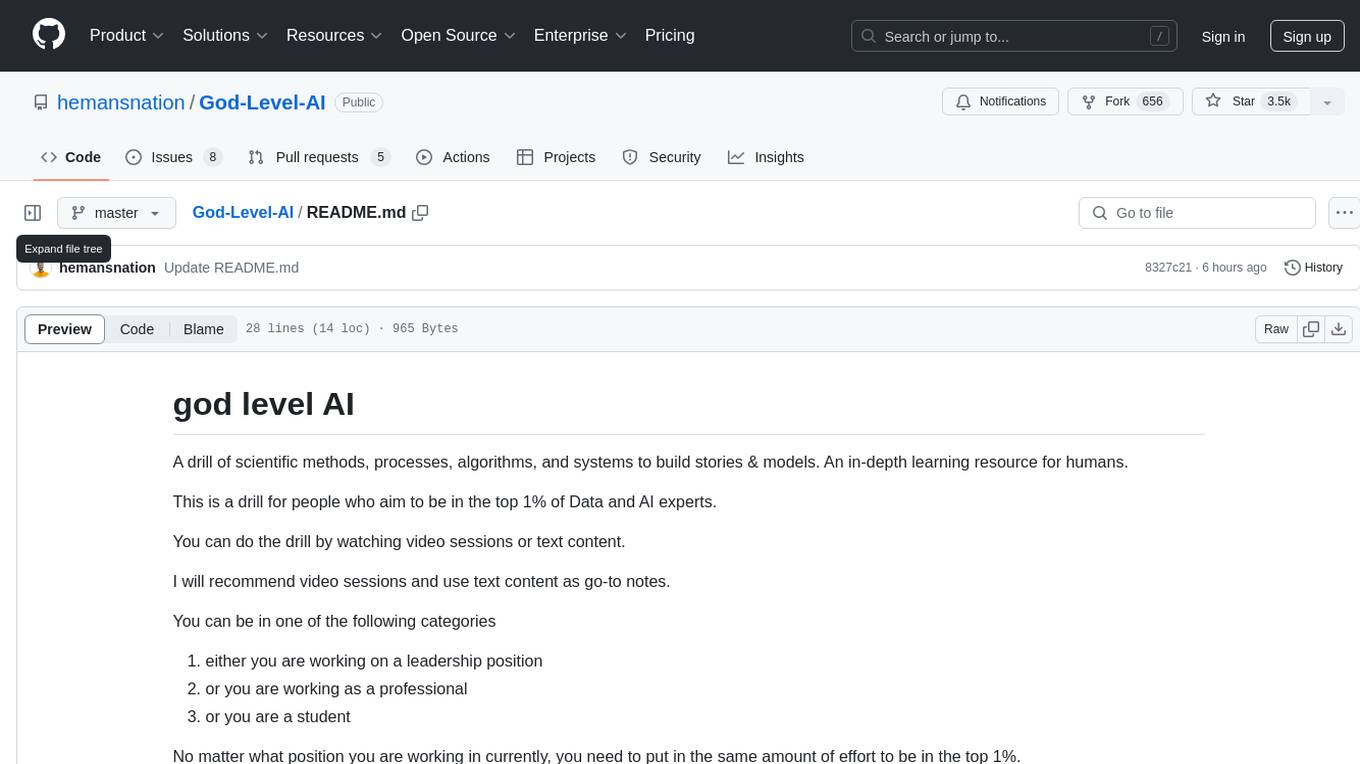
God-Level-AI
A drill of scientific methods, processes, algorithms, and systems to build stories & models. An in-depth learning resource for humans. This repository is designed for individuals aiming to excel in the field of Data and AI, providing video sessions and text content for learning. It caters to those in leadership positions, professionals, and students, emphasizing the need for dedicated effort to achieve excellence in the tech field. The content covers various topics with a focus on practical application.
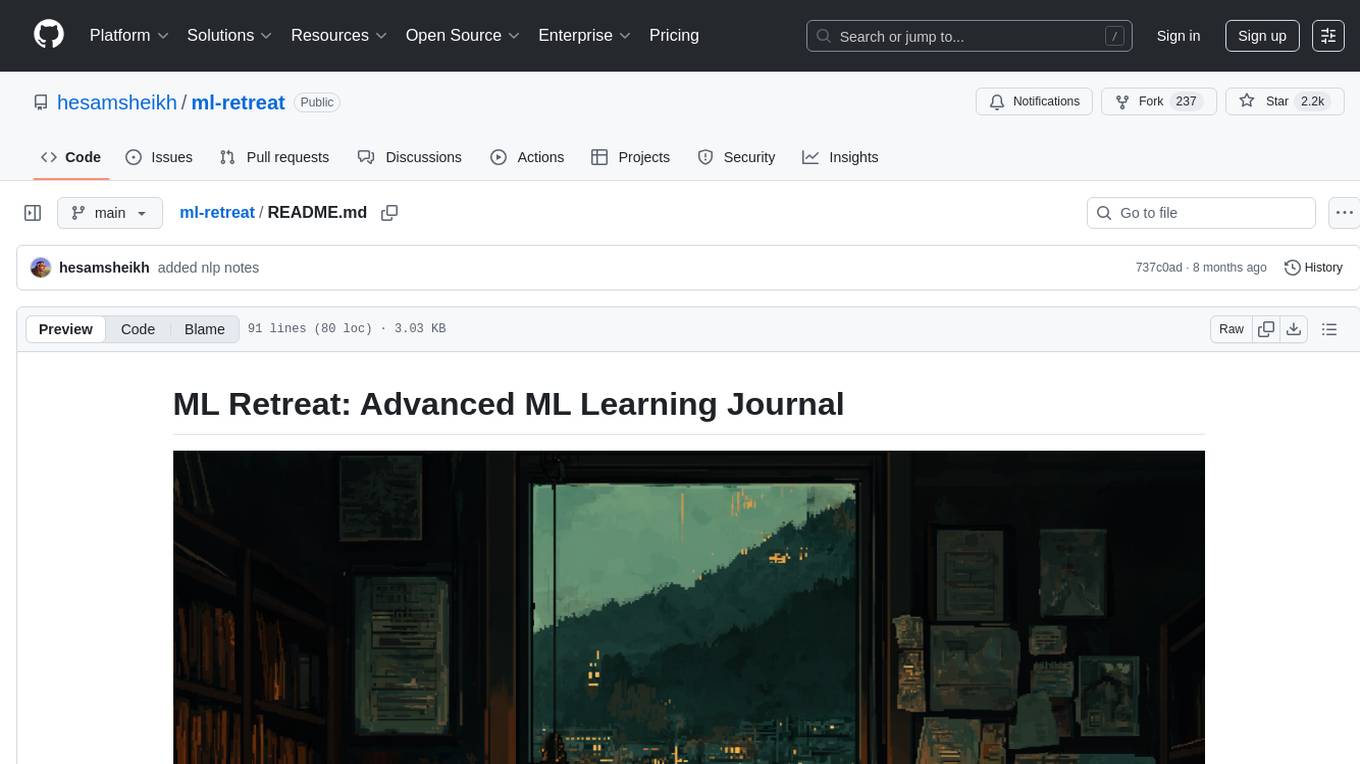
ml-retreat
ML-Retreat is a comprehensive machine learning library designed to simplify and streamline the process of building and deploying machine learning models. It provides a wide range of tools and utilities for data preprocessing, model training, evaluation, and deployment. With ML-Retreat, users can easily experiment with different algorithms, hyperparameters, and feature engineering techniques to optimize their models. The library is built with a focus on scalability, performance, and ease of use, making it suitable for both beginners and experienced machine learning practitioners.
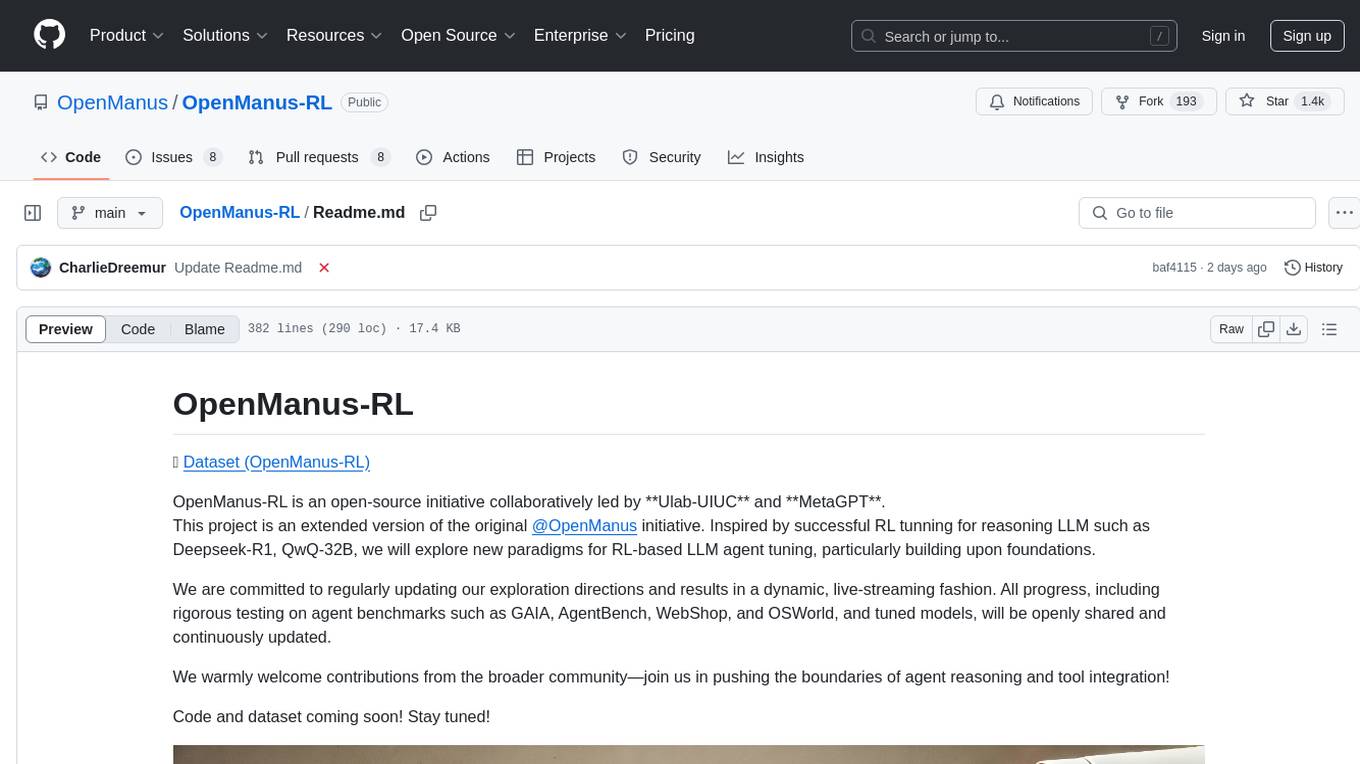
OpenManus-RL
OpenManus-RL is an open-source initiative focused on enhancing reasoning and decision-making capabilities of large language models (LLMs) through advanced reinforcement learning (RL)-based agent tuning. The project explores novel algorithmic structures, diverse reasoning paradigms, sophisticated reward strategies, and extensive benchmark environments. It aims to push the boundaries of agent reasoning and tool integration by integrating insights from leading RL tuning frameworks and continuously updating progress in a dynamic, live-streaming fashion.
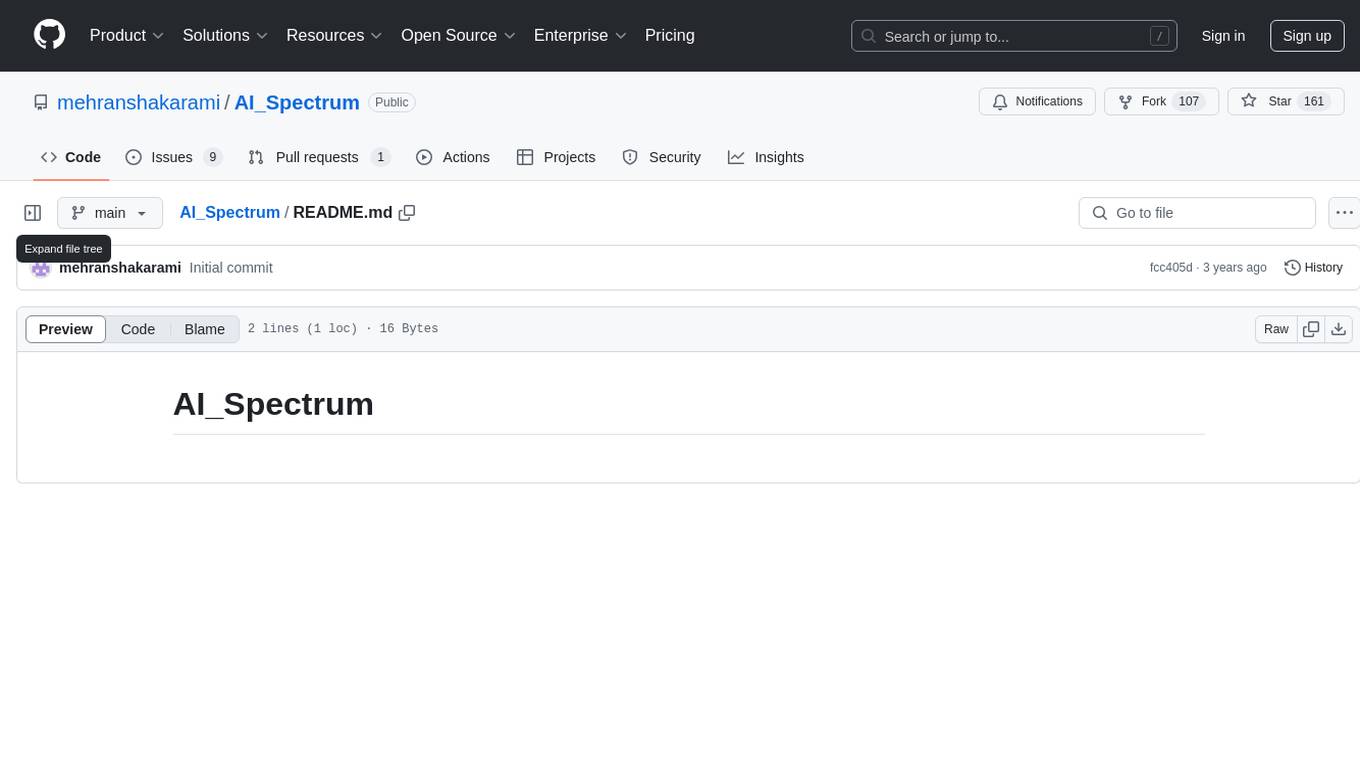
AI_Spectrum
AI_Spectrum is a versatile machine learning library that provides a wide range of tools and algorithms for building and deploying AI models. It offers a user-friendly interface for data preprocessing, model training, and evaluation. With AI_Spectrum, users can easily experiment with different machine learning techniques and optimize their models for various tasks. The library is designed to be flexible and scalable, making it suitable for both beginners and experienced data scientists.
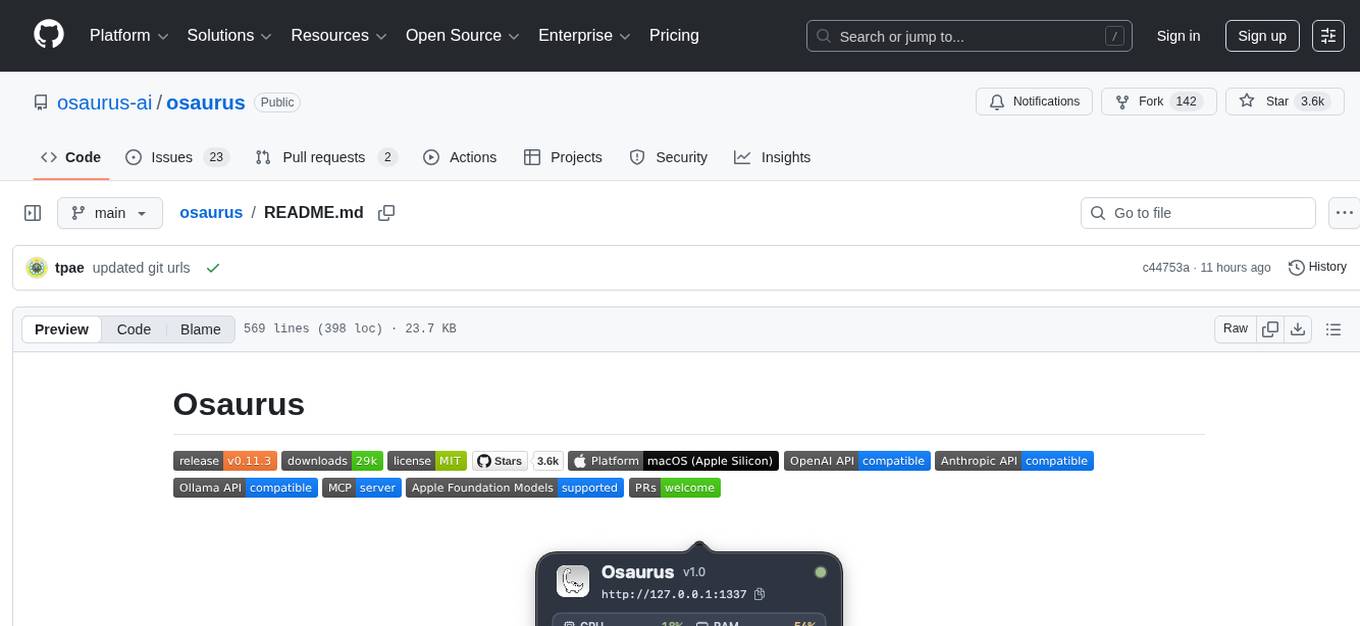
osaurus
Osaurus is a versatile open-source tool designed for data scientists and machine learning engineers. It provides a wide range of functionalities for data preprocessing, feature engineering, model training, and evaluation. With Osaurus, users can easily clean and transform raw data, extract relevant features, build and tune machine learning models, and analyze model performance. The tool supports various machine learning algorithms and techniques, making it suitable for both beginners and experienced practitioners in the field. Osaurus is actively maintained and updated to incorporate the latest advancements in the machine learning domain, ensuring users have access to state-of-the-art tools and methodologies for their projects.

deeppowers
Deeppowers is a powerful Python library for deep learning applications. It provides a wide range of tools and utilities to simplify the process of building and training deep neural networks. With Deeppowers, users can easily create complex neural network architectures, perform efficient training and optimization, and deploy models for various tasks. The library is designed to be user-friendly and flexible, making it suitable for both beginners and experienced deep learning practitioners.
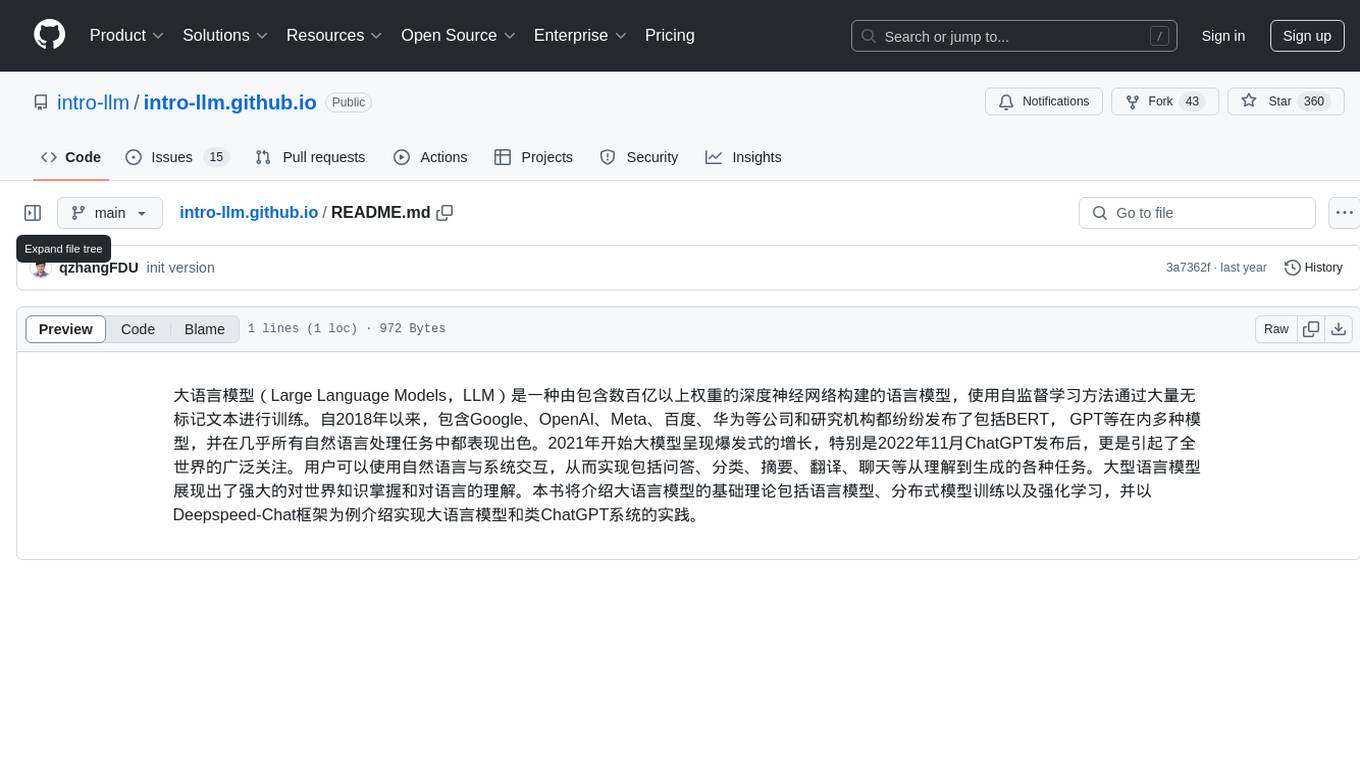
intro-llm.github.io
Large Language Models (LLM) are language models built by deep neural networks containing hundreds of billions of weights, trained on a large amount of unlabeled text using self-supervised learning methods. Since 2018, companies and research institutions including Google, OpenAI, Meta, Baidu, and Huawei have released various models such as BERT, GPT, etc., which have performed well in almost all natural language processing tasks. Starting in 2021, large models have shown explosive growth, especially after the release of ChatGPT in November 2022, attracting worldwide attention. Users can interact with systems using natural language to achieve various tasks from understanding to generation, including question answering, classification, summarization, translation, and chat. Large language models demonstrate powerful knowledge of the world and understanding of language. This repository introduces the basic theory of large language models including language models, distributed model training, and reinforcement learning, and uses the Deepspeed-Chat framework as an example to introduce the implementation of large language models and ChatGPT-like systems.
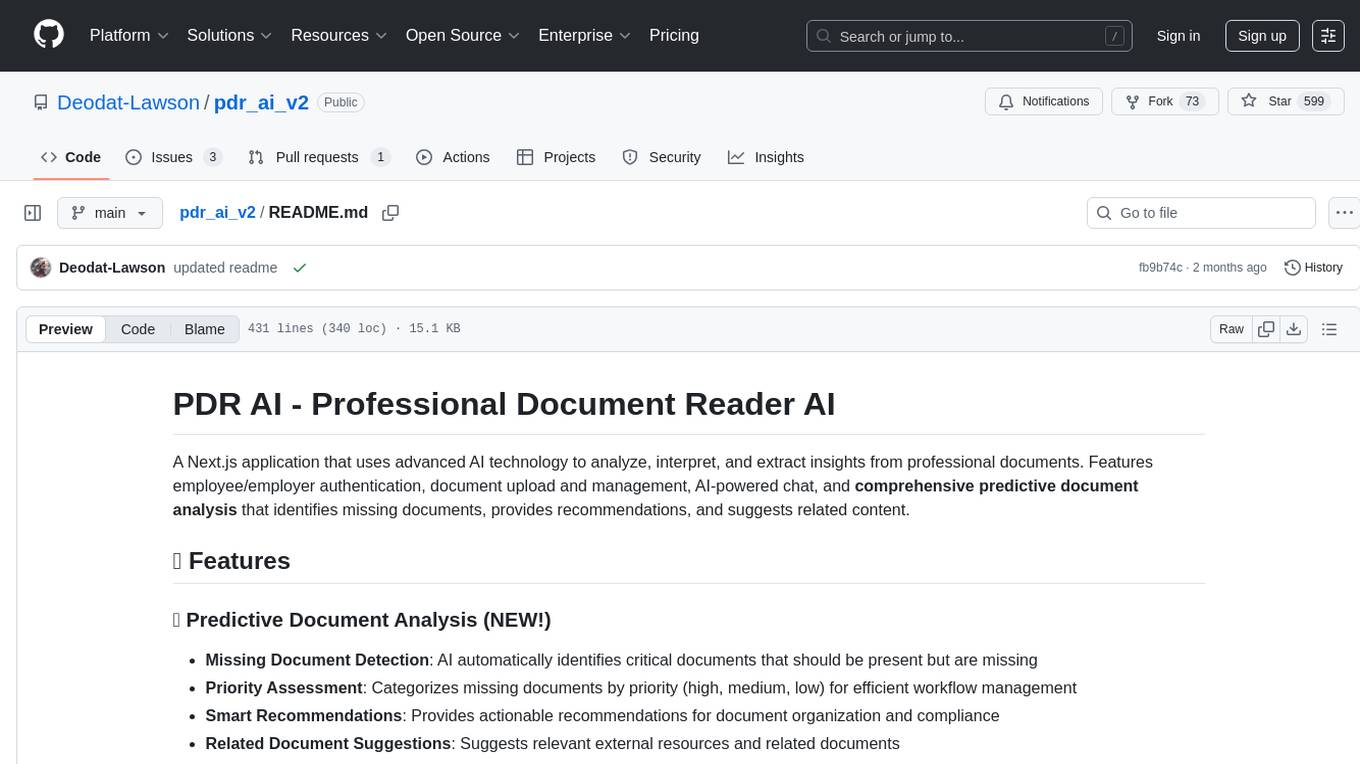
pdr_ai_v2
pdr_ai_v2 is a Python library for implementing machine learning algorithms and models. It provides a wide range of tools and functionalities for data preprocessing, model training, evaluation, and deployment. The library is designed to be user-friendly and efficient, making it suitable for both beginners and experienced data scientists. With pdr_ai_v2, users can easily build and deploy machine learning models for various applications, such as classification, regression, clustering, and more.
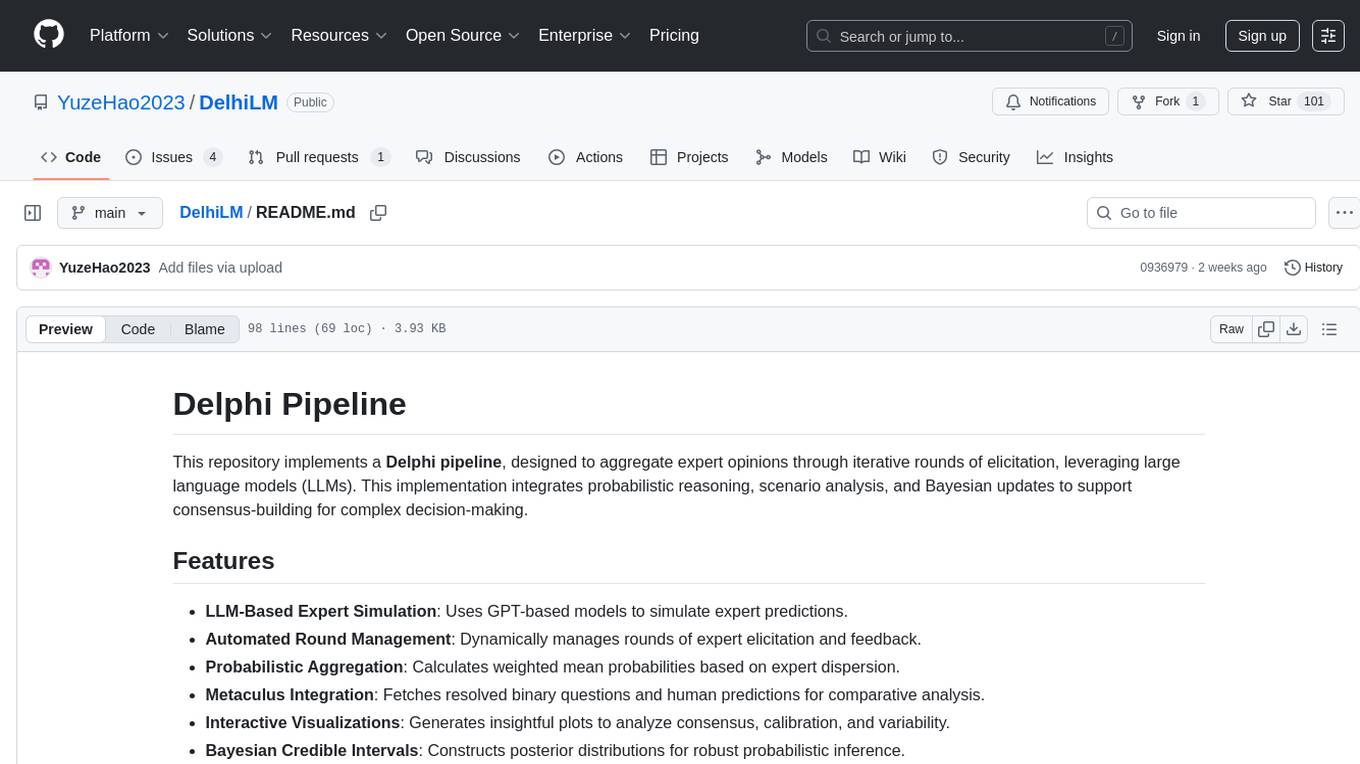
DelhiLM
DelhiLM is a natural language processing tool for building and training language models. It provides a user-friendly interface for text processing tasks such as tokenization, lemmatization, and language model training. With DelhiLM, users can easily preprocess text data and train custom language models for various NLP applications. The tool supports different languages and allows for fine-tuning pre-trained models to suit specific needs. DelhiLM is designed to be flexible, efficient, and easy to use for both beginners and experienced NLP practitioners.

lemonai
LemonAI is a versatile machine learning library designed to simplify the process of building and deploying AI models. It provides a wide range of tools and algorithms for data preprocessing, model training, and evaluation. With LemonAI, users can easily experiment with different machine learning techniques and optimize their models for various tasks. The library is well-documented and beginner-friendly, making it suitable for both novice and experienced data scientists. LemonAI aims to streamline the development of AI applications and empower users to create innovative solutions using state-of-the-art machine learning methods.
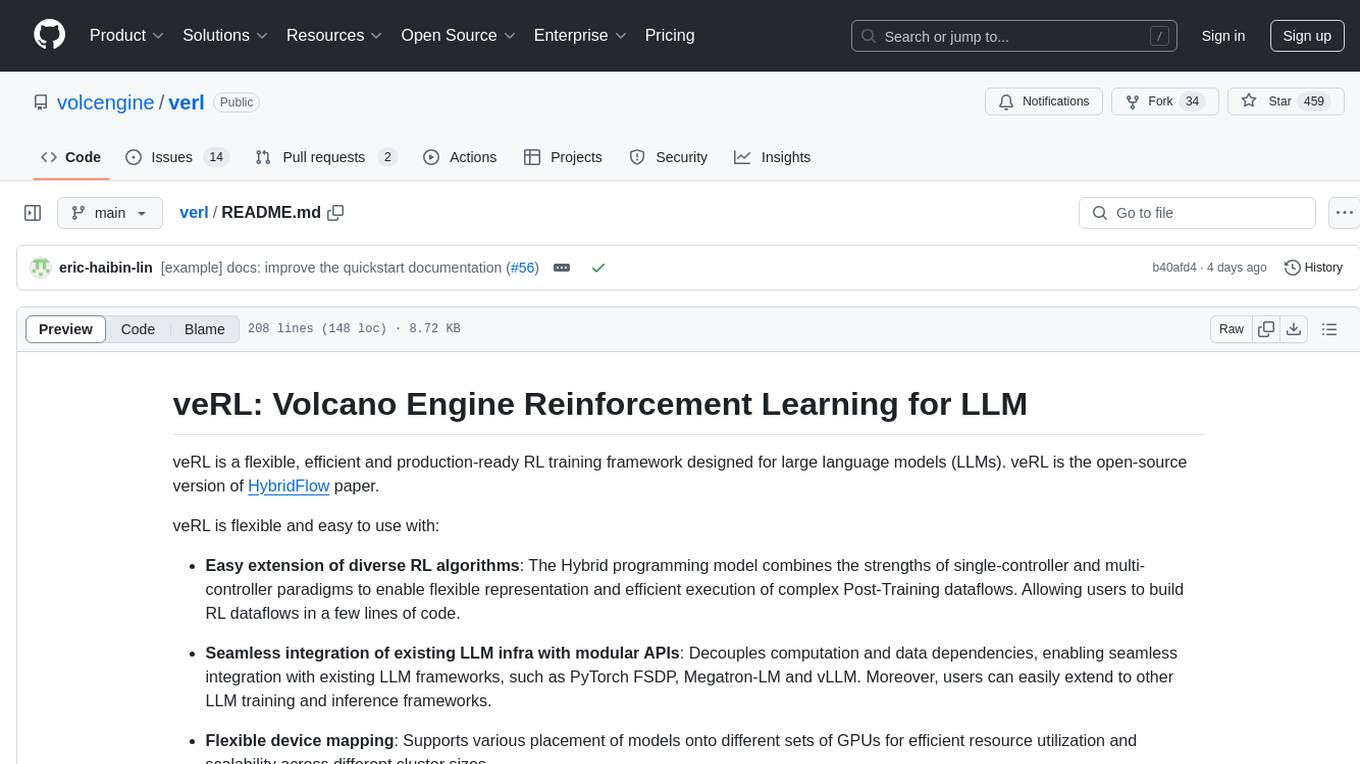
verl
veRL is a flexible and efficient reinforcement learning training framework designed for large language models (LLMs). It allows easy extension of diverse RL algorithms, seamless integration with existing LLM infrastructures, and flexible device mapping. The framework achieves state-of-the-art throughput and efficient actor model resharding with 3D-HybridEngine. It supports popular HuggingFace models and is suitable for users working with PyTorch FSDP, Megatron-LM, and vLLM backends.
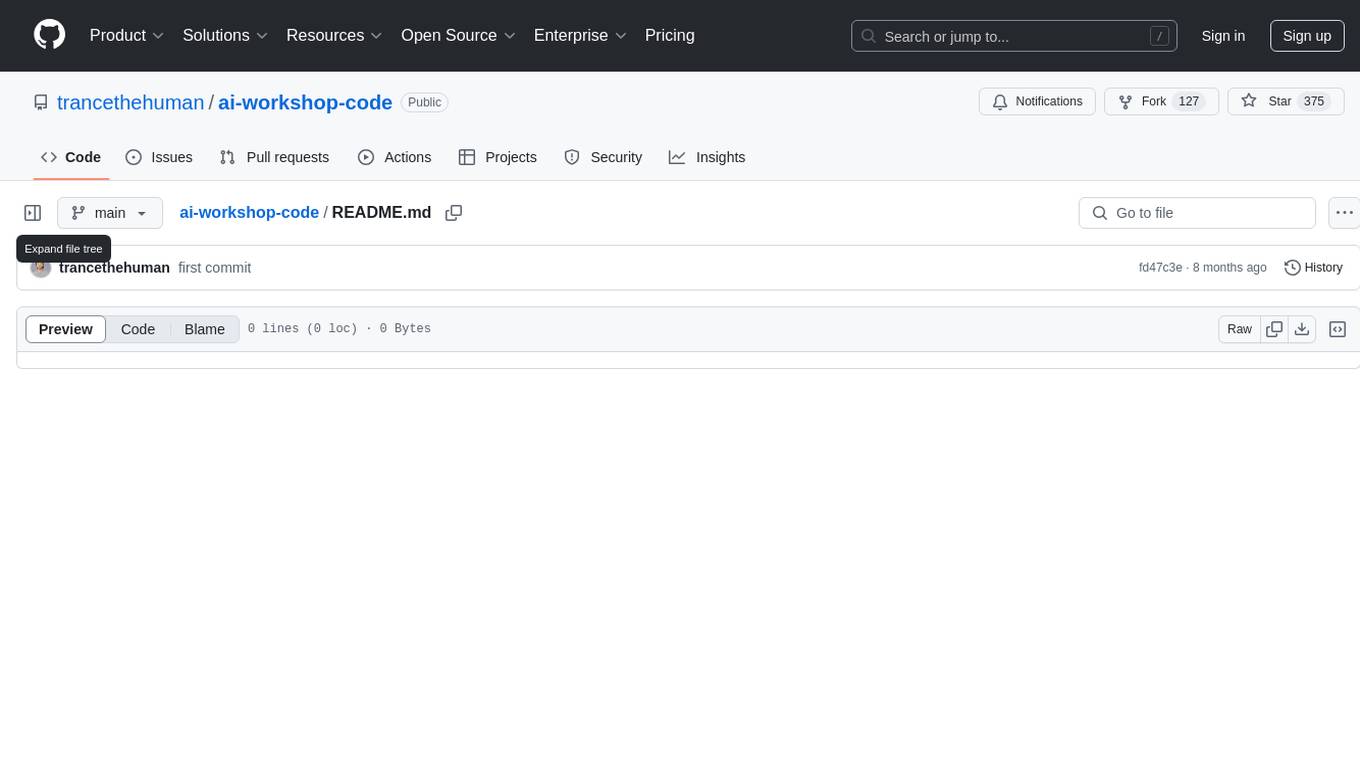
ai-workshop-code
The ai-workshop-code repository contains code examples and tutorials for various artificial intelligence concepts and algorithms. It serves as a practical resource for individuals looking to learn and implement AI techniques in their projects. The repository covers a wide range of topics, including machine learning, deep learning, natural language processing, computer vision, and reinforcement learning. By exploring the code and following the tutorials, users can gain hands-on experience with AI technologies and enhance their understanding of how these algorithms work in practice.
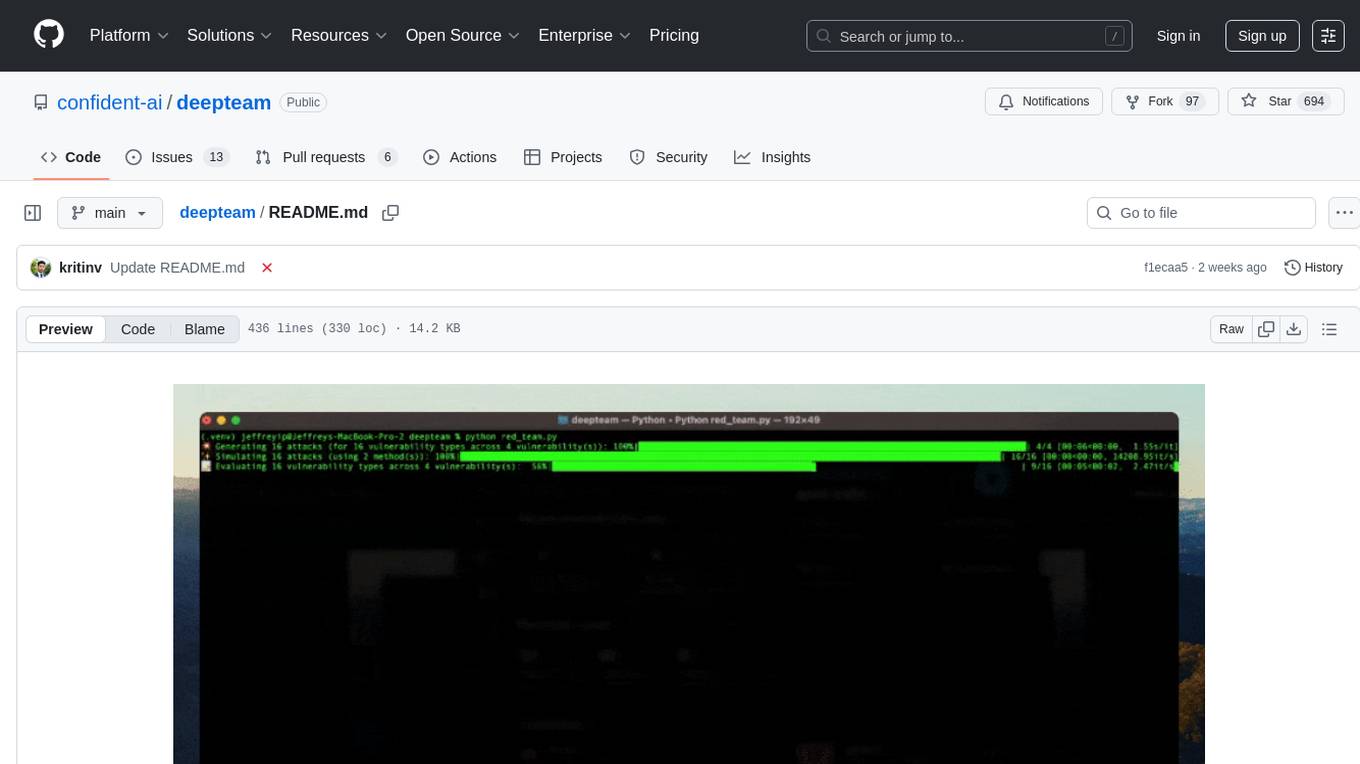
deepteam
Deepteam is a powerful open-source tool designed for deep learning projects. It provides a user-friendly interface for training, testing, and deploying deep neural networks. With Deepteam, users can easily create and manage complex models, visualize training progress, and optimize hyperparameters. The tool supports various deep learning frameworks and allows seamless integration with popular libraries like TensorFlow and PyTorch. Whether you are a beginner or an experienced deep learning practitioner, Deepteam simplifies the development process and accelerates model deployment.
For similar tasks

alignment-handbook
The Alignment Handbook provides robust training recipes for continuing pretraining and aligning language models with human and AI preferences. It includes techniques such as continued pretraining, supervised fine-tuning, reward modeling, rejection sampling, and direct preference optimization (DPO). The handbook aims to fill the gap in public resources on training these models, collecting data, and measuring metrics for optimal downstream performance.
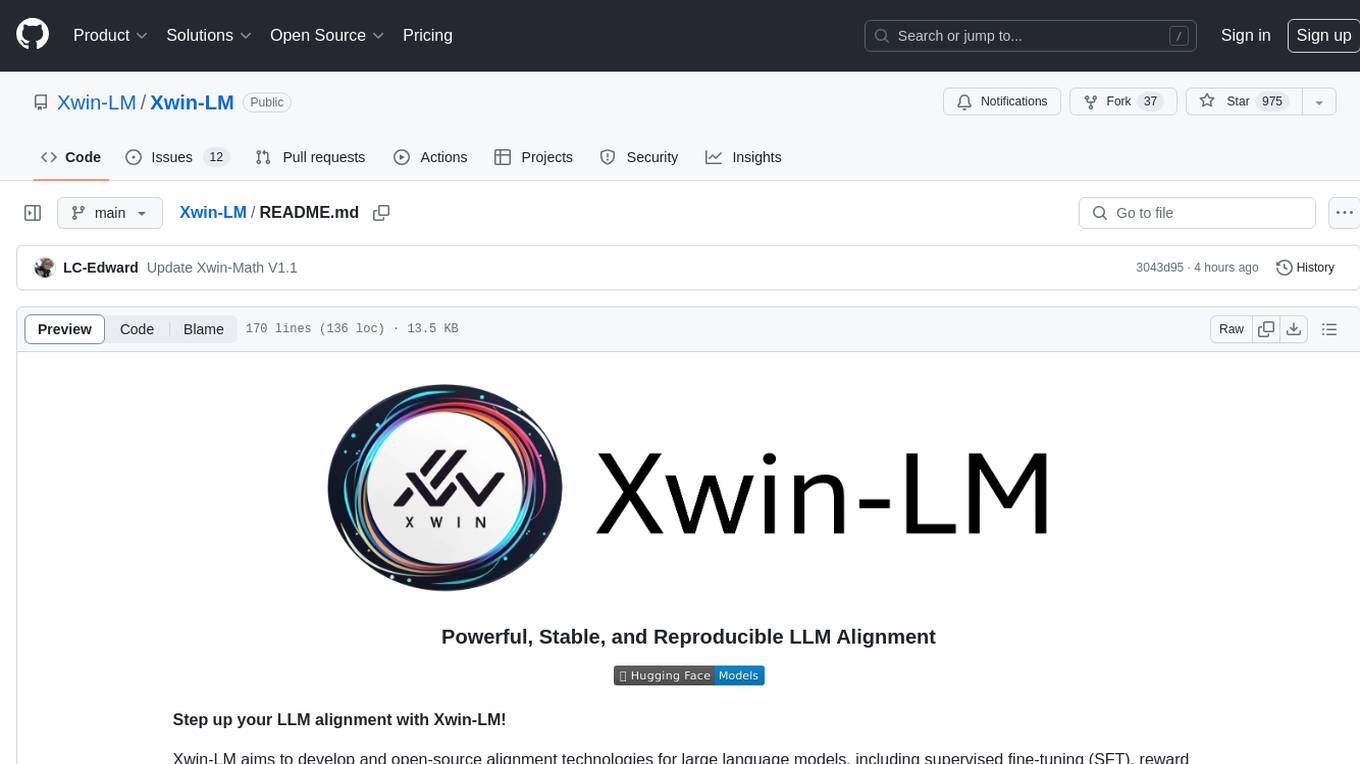
Xwin-LM
Xwin-LM is a powerful and stable open-source tool for aligning large language models, offering various alignment technologies like supervised fine-tuning, reward models, reject sampling, and reinforcement learning from human feedback. It has achieved top rankings in benchmarks like AlpacaEval and surpassed GPT-4. The tool is continuously updated with new models and features.
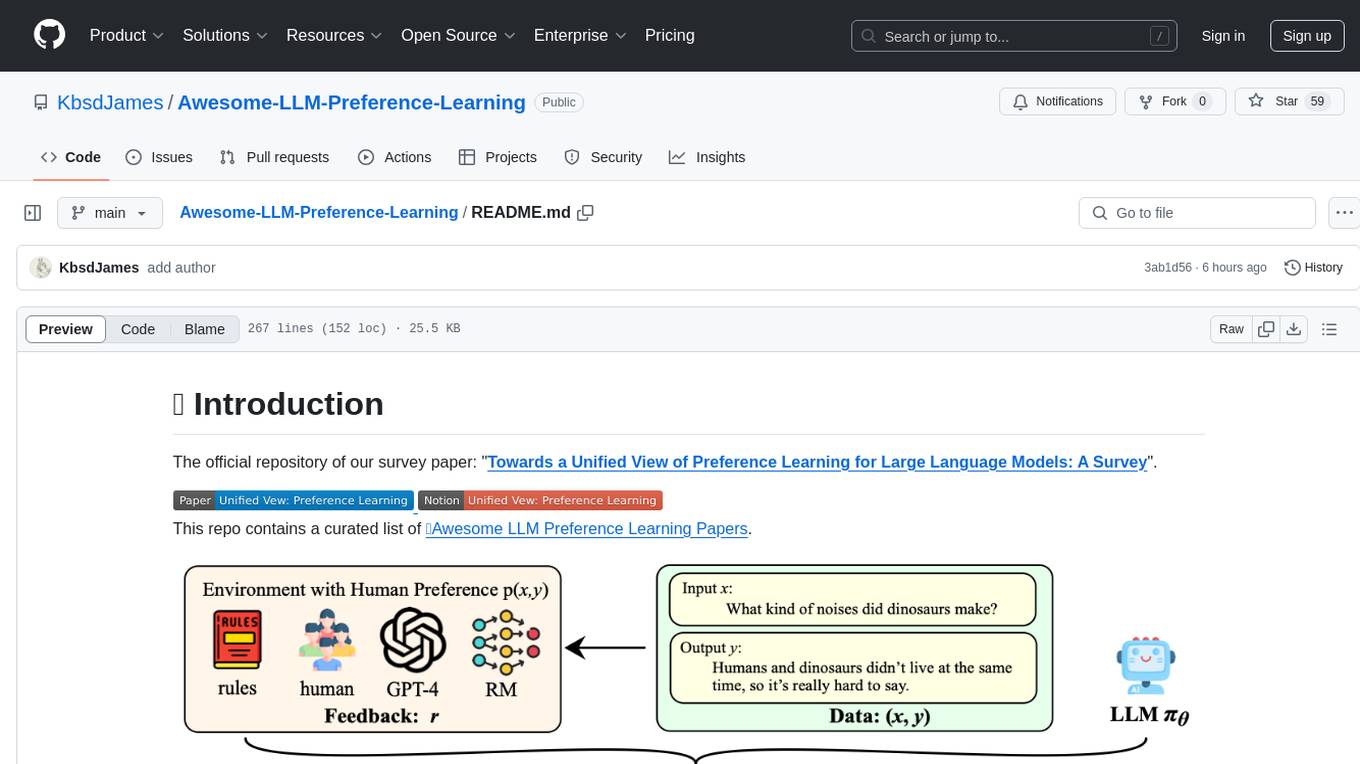
Awesome-LLM-Preference-Learning
The repository 'Awesome-LLM-Preference-Learning' is the official repository of a survey paper titled 'Towards a Unified View of Preference Learning for Large Language Models: A Survey'. It contains a curated list of papers related to preference learning for Large Language Models (LLMs). The repository covers various aspects of preference learning, including on-policy and off-policy methods, feedback mechanisms, reward models, algorithms, evaluation techniques, and more. The papers included in the repository explore different approaches to aligning LLMs with human preferences, improving mathematical reasoning in LLMs, enhancing code generation, and optimizing language model performance.
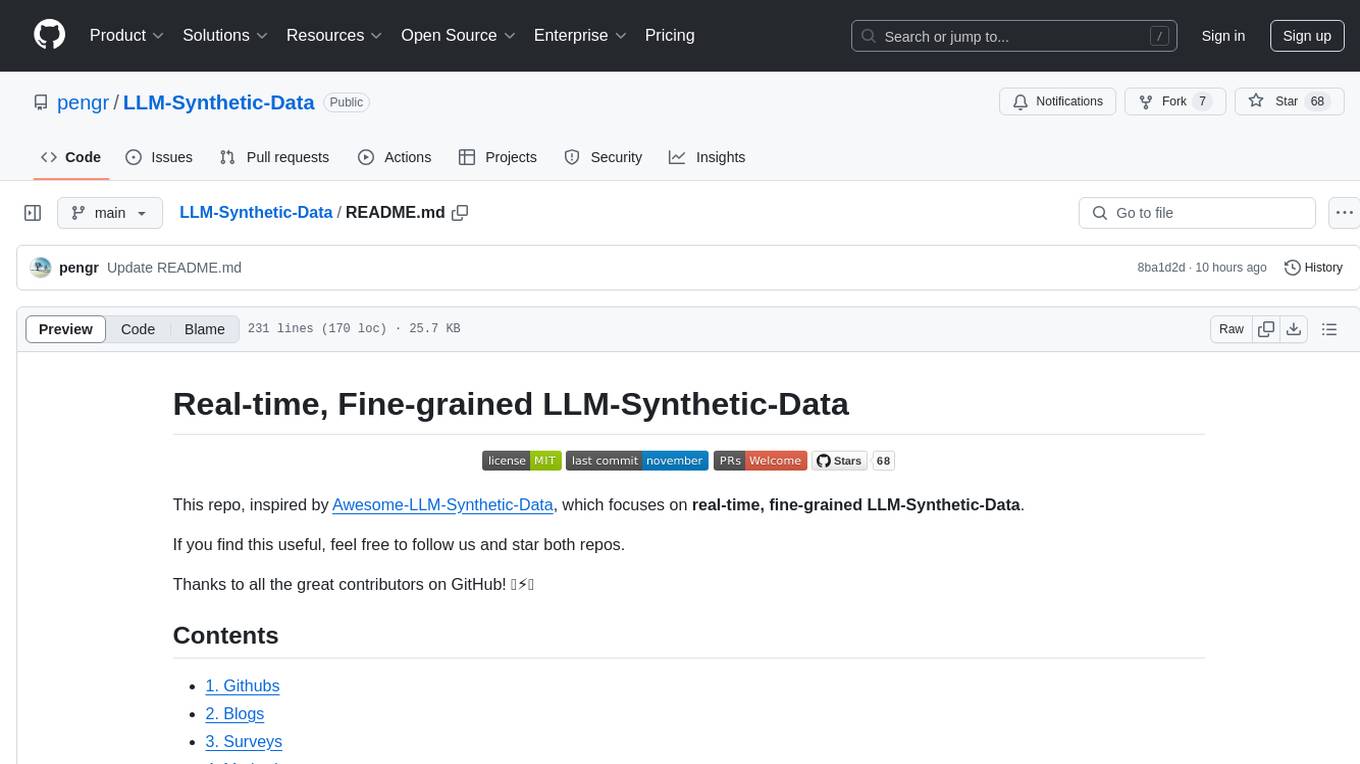
LLM-Synthetic-Data
LLM-Synthetic-Data is a repository focused on real-time, fine-grained LLM-Synthetic-Data generation. It includes methods, surveys, and application areas related to synthetic data for language models. The repository covers topics like pre-training, instruction tuning, model collapse, LLM benchmarking, evaluation, and distillation. It also explores application areas such as mathematical reasoning, code generation, text-to-SQL, alignment, reward modeling, long context, weak-to-strong generalization, agent and tool use, vision and language, factuality, federated learning, generative design, and safety.
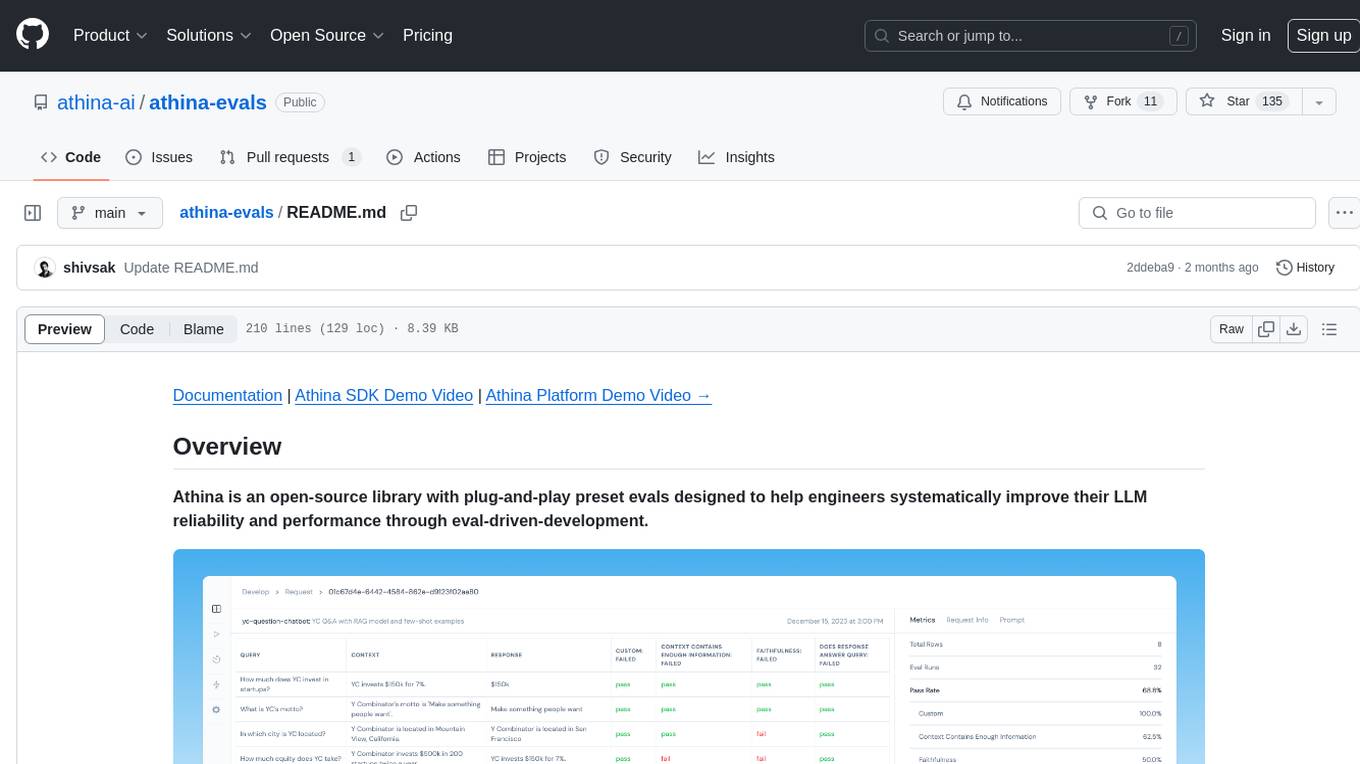
athina-evals
Athina is an open-source library designed to help engineers improve the reliability and performance of Large Language Models (LLMs) through eval-driven development. It offers plug-and-play preset evals for catching and preventing bad outputs, measuring model performance, running experiments, A/B testing models, detecting regressions, and monitoring production data. Athina provides a solution to the flaws in current LLM developer workflows by offering rapid experimentation, customizable evaluators, integrated dashboard, consistent metrics, historical record tracking, and easy setup. It includes preset evaluators for RAG applications and summarization accuracy, as well as the ability to write custom evals. Athina's evals can run on both development and production environments, providing consistent metrics and removing the need for manual infrastructure setup.

agentcloud
AgentCloud is an open-source platform that enables companies to build and deploy private LLM chat apps, empowering teams to securely interact with their data. It comprises three main components: Agent Backend, Webapp, and Vector Proxy. To run this project locally, clone the repository, install Docker, and start the services. The project is licensed under the GNU Affero General Public License, version 3 only. Contributions and feedback are welcome from the community.

chatbot-ui
Chatbot UI is an open-source AI chat app that allows users to create and deploy their own AI chatbots. It is easy to use and can be customized to fit any need. Chatbot UI is perfect for businesses, developers, and anyone who wants to create a chatbot.

botpress
Botpress is a platform for building next-generation chatbots and assistants powered by OpenAI. It provides a range of tools and integrations to help developers quickly and easily create and deploy chatbots for various use cases.
For similar jobs

alignment-handbook
The Alignment Handbook provides robust training recipes for continuing pretraining and aligning language models with human and AI preferences. It includes techniques such as continued pretraining, supervised fine-tuning, reward modeling, rejection sampling, and direct preference optimization (DPO). The handbook aims to fill the gap in public resources on training these models, collecting data, and measuring metrics for optimal downstream performance.
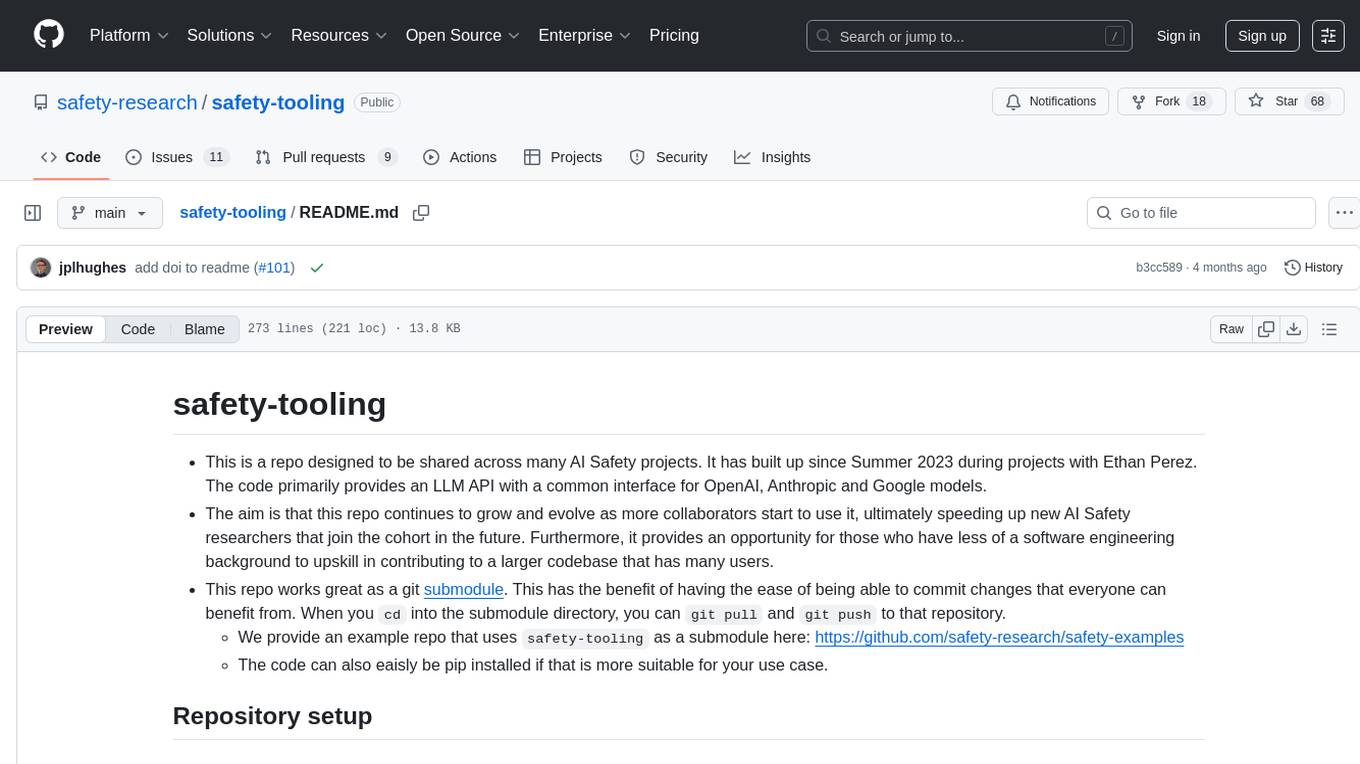
safety-tooling
This repository, safety-tooling, is designed to be shared across various AI Safety projects. It provides an LLM API with a common interface for OpenAI, Anthropic, and Google models. The aim is to facilitate collaboration among AI Safety researchers, especially those with limited software engineering backgrounds, by offering a platform for contributing to a larger codebase. The repo can be used as a git submodule for easy collaboration and updates. It also supports pip installation for convenience. The repository includes features for installation, secrets management, linting, formatting, Redis configuration, testing, dependency management, inference, finetuning, API usage tracking, and various utilities for data processing and experimentation.
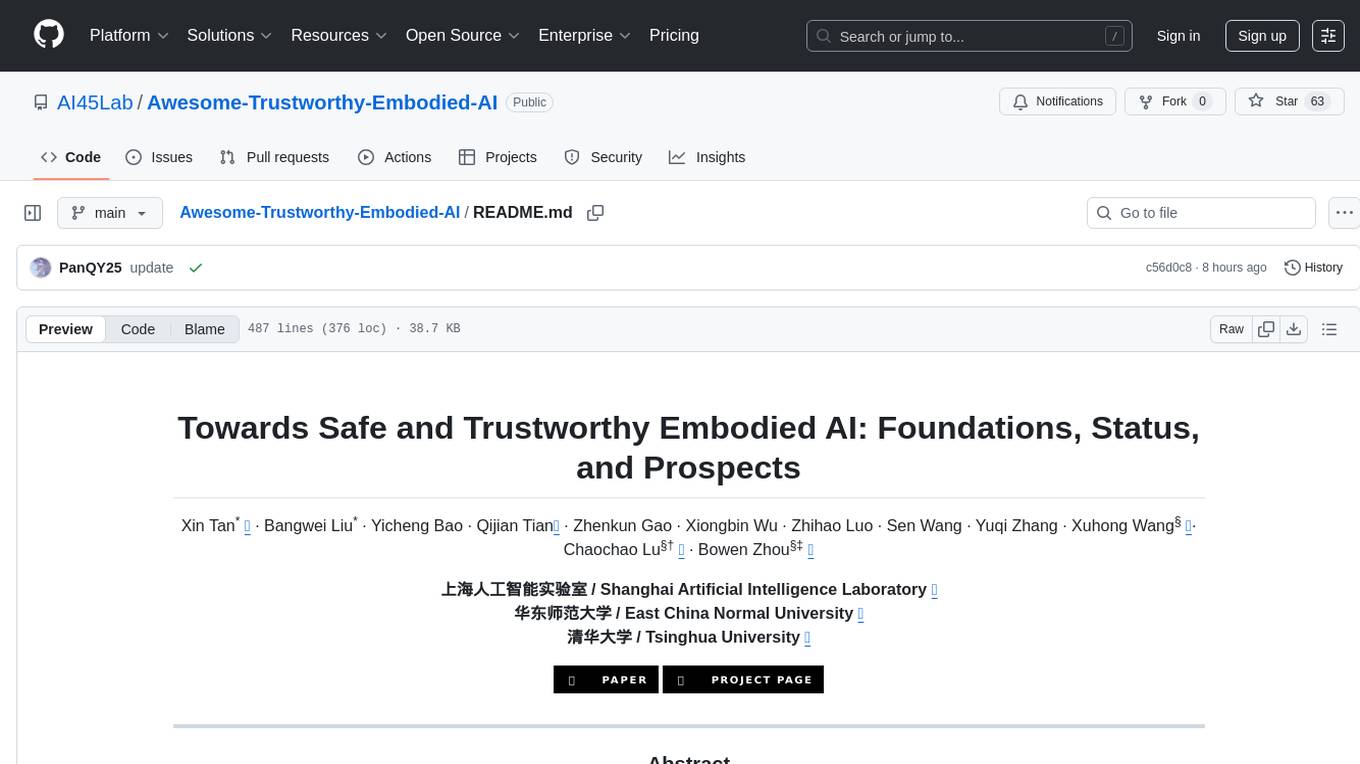
Awesome-Trustworthy-Embodied-AI
The Awesome Trustworthy Embodied AI repository focuses on the development of safe and trustworthy Embodied Artificial Intelligence (EAI) systems. It addresses critical challenges related to safety and trustworthiness in EAI, proposing a unified research framework and defining levels of safety and resilience. The repository provides a comprehensive review of state-of-the-art solutions, benchmarks, and evaluation metrics, aiming to bridge the gap between capability advancement and safety mechanisms in EAI development.

ChatFAQ
ChatFAQ is an open-source comprehensive platform for creating a wide variety of chatbots: generic ones, business-trained, or even capable of redirecting requests to human operators. It includes a specialized NLP/NLG engine based on a RAG architecture and customized chat widgets, ensuring a tailored experience for users and avoiding vendor lock-in.

agentcloud
AgentCloud is an open-source platform that enables companies to build and deploy private LLM chat apps, empowering teams to securely interact with their data. It comprises three main components: Agent Backend, Webapp, and Vector Proxy. To run this project locally, clone the repository, install Docker, and start the services. The project is licensed under the GNU Affero General Public License, version 3 only. Contributions and feedback are welcome from the community.

anything-llm
AnythingLLM is a full-stack application that enables you to turn any document, resource, or piece of content into context that any LLM can use as references during chatting. This application allows you to pick and choose which LLM or Vector Database you want to use as well as supporting multi-user management and permissions.

ai-guide
This guide is dedicated to Large Language Models (LLMs) that you can run on your home computer. It assumes your PC is a lower-end, non-gaming setup.

Magick
Magick is a groundbreaking visual AIDE (Artificial Intelligence Development Environment) for no-code data pipelines and multimodal agents. Magick can connect to other services and comes with nodes and templates well-suited for intelligent agents, chatbots, complex reasoning systems and realistic characters.
